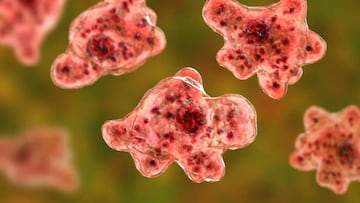Nevada boy dies from brain-eating amoeba: is it safe to drink water near Lake Mead?
Cases of Naegleria Fowleri infection are incredibly rare but the CDC has issued guidance to keep safe when swimming in warm freshwater.


The Southern Nevada Health District has confirmed that a boy has died after being infected with a rare brain-eating amoeba. Local officials believe that the boy may have come into contact with the organism at Lake Mead.
The amoeba, known as Naegleria Fowleri, is thought to have been present at the lake’s Arizona shore, near to the Hoover Dam. The microscopic organism is fairly common in warm freshwater, but infections are rare.
In a press release the Lake Mead National Recreation Area said: “This is the first confirmed fatality caused by Naegleria Fowleri exposure at Lake Mead National Recreation Area.”
The Centers for Disease Control and Prevention (CDC) have recorded only 31 cases of Naegleria Fowleri infection between 2012 and 2021. However, when infections are found they are nearly always fatal.
Naegleria Fowleri is not dangerous when swallowed and cannot be transmitted between people. It typically enters the body through the nose when swimming or diving into warm freshwater.
The CDC recommends holding or clipping your nose shut when swimming or jumping into warm freshwater. It is also advised that swimmers avoid putting their head underwater in hot springs, when the amoeba finds it easier to survive.
Is it safe to swim at Lake Mead?
While the death of the boy, whose name and age have not been released, was tragic, the threat to life posed by the amoeba is incredibly small. His was thought to have been the third infection in the United States this year.
“While I want to reassure the public that this type of infection is an extremely rare occurrence, I know this brings no comfort to his family and friends at this time,” said Dr Fermin Leguen, Southern Nevada District Health Officer.
Lake Mead will remain open for recreational swimmers and there is not thought to be any elevate risk to the public. Provided that swimmers exercise precaution and try to avoid taking in water through the nose there is no reason to fear.
Related stories
United States Public Health Service Officer Dr Maria Said explained that “the organism exists naturally and commonly in the environment but disease is extremely rare.”
“However, recreational water users should always assume there is a risk anytime they enter warm fresh water,” she added.

